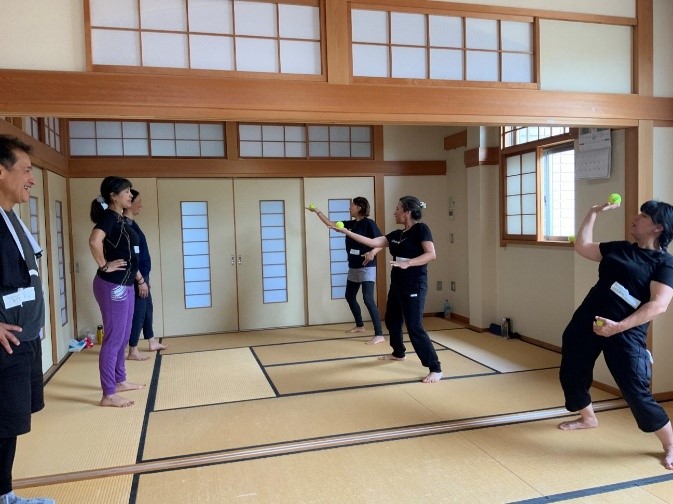Seeing migration issues as matters that also concern us
If you live in Japan, you may think that migration is an issue of distant countries. However, in reality, many foreign workers are working in convenience stores, restaurants, healthcare and nursing care, manufacturing, and construction sites, where they play essential roles in supporting daily life in Japan. Migration issues are not simply somebody else’s problem; they also affect us personally.
If you hold the prejudice that an increasing number of foreigners will take your job away and cause more crime, it will be difficult for both sides to find common ground. When we Asians go to European cultural areas, we often encounter local people who hold similar prejudices. They might ignore you or insult you for being Asian. If the roles were reversed, you could be in their shoes.
I have an interest in Latin American countries, such as Argentina, Chile, Peru, Uruguay, and Cuba, because I study theater in Spanish- and Catalan-speaking regions. Many people in Latin America emigrate overseas. For example, people from Spanish-speaking countries, such as Argentina and Chile, go to Spain or Portugal, where they can easily communicate, while people of Japanese descent from Brazil and Peru come to Japan. In politically unstable countries like Colombia, some people are forced to move from conflict zones to other regions within the country, creating diverse migration patterns.
The fact that a number of people emigrate from Latin American countries is also linked to their history as former colonies. These countries became independent from their colonial rulers (mainly Spain and Portugal) after a long period of oppression. That said, they have not yet achieved true independence, and their social structures have largely remained unchanged from before. Some countries are politically unstable or ruled by dictators, which impacts their politics and economy. People other than the privileged have difficulty making a living, and severe poverty and unsafe environments often force them to leave their homes. This can, in a sense, be interpreted as a form of asylum. The challenge lies in protecting human dignity, including providing these people with basic food, clothing, and housing.
Under a military regime, playhouses are destroyed in bombings, and theater become a target of repression
Let us take Argentina as an example to see what happened in a country under a military dictatorship. Argentina was a Spanish colony from the 16th through the 18th century and became independent in 1816 following an independence movement. After World War II, the country was intermittently under military rule, and the last military dictatorship lasted from 1976 to 1983.
During these periods, the publication, sale, distribution, and performance of politically and socially themed plays were prohibited. In fact, shortly before the onset of military rule, playhouses were bombed, people involved in theater received death threats, and there were other forms of interference.
It is thought that art, especially theater, is often targeted for repression because it is an influential medium. Authorities probably feared that art could stir the public. Although it was a different era, one of my acquaintances, an artist who had been blacklisted, temporarily fled abroad out of fear.
Artists who were even slightly critical of the regime experienced severe repression, including kidnapping, imprisonment, torture, and murder, and were completely ostracized. Between 1976 and 1983, it is estimated that about 30,000 people were killed or kidnapped by the government and went missing. Women whose family members had been taken protested at the Plaza de Mayo in front of the presidential palace in Buenos Aires, demanding, “Bring back my husband, bring back my son.” They have come to be known as the Mothers of the Plaza de Mayo. The activity still takes place every Thursday. This part of history is not yet closed.
Artists have also taken a stand. At the end of the military regime, from 1981 to 1983, there was a resistance movement called Open Theater (Teatro Abierto). Twenty-one playwrights joined forces, each producing a short play and performing three plays each day. Because the tickets sold out every time and the plays attracted attention, the regime seemed to have taken notice, and the playhouse was blown up a week later. After that, they moved to another playhouse and continued performing, becoming known both domestically and internationally.
I believe that artists can create their work quite freely in Argentina today. However, the current president, Javier Milei, also seems wary of art, which influences people, and therefore, some forms of censorship, such as budget cuts and event cancellations related to art, have been carried out.
What theater can do for Latin American immigrants
Argentina and other countries that experienced dictatorships, such as Chile and Uruguay, bear deep scars, and works that look back on those times are still being produced today. People surely feel that they must not forget the past. In Chile, the Museum of Memory and Human Rights was established in its capital Santiago, to commemorate those who lost their lives under General Pinochet’s military rule (1973–1990).
Naturally, works with contemporary themes are also being created. Here, let me introduce the Uruguayan playwright Marianella Morena. She often incorporates the perspectives of women and the vulnerable.
For example, one of her distinctive works features the real-life brilliant poet Delmira Agustini (1886–1914). After her marriage, Delmira grew tired of her terribly ordinary life and her husband and divorced quickly. Nevertheless, even after the divorce, the two continued to meet as lovers. However, during one of their encounters, she was shot to death by her ex-husband, who later committed suicide. Although this shocking incident had often been treated as a love affair, Marianella Morena approached it from a different angle. It was not just a biographical drama; she also depicted what freedom meant to Delmira and why she was fixated on poetry. I understand that it was created from a highly theatrical perspective and shows a great deal of originality.
Moreover, Marianella Morena has worked with transgender people living along the border between Uruguay and Brazil, and addresses universal themes that could happen in any country, such as the murder of a minor involved in sugar daddy dating.
Colombian director Santiago Garcia said, “Art is not a luxury, but a necessity.” While Japanese people may be unfamiliar with art such as theater, it is an essential and familiar part of daily life for Latin American people.
I run theater workshops with immigrants from Peru to harness such power of theater and art. People who are forced to live as immigrants often face various issues, including low self-esteem and trauma. Similarly, those who came to Japan are isolated because they do not understand the language, and their children face bullying. What role might theater play for them?

Another English word for theater is play, which also means “pleasurable activity.” What happens in the moment can be called “play.” Focusing on theater while casually playing helps you discover sides of yourself you did not know, engage in conversation with strangers, and experience a sense of accomplishment from working as a group. In that sense, theater can be considered a way to connect people with society.
This alone cannot address immigrants’ living situations and issues. Still, I hope they can offer people a small guidance for living better.
* The information contained herein is current as of April 2025.
* The contents of articles on Meiji.net are based on the personal ideas and opinions of the author and do not indicate the official opinion of Meiji University.
* I work to achieve SDGs related to the educational and research themes that I am currently engaged in.
Information noted in the articles and videos, such as positions and affiliations, are current at the time of production.

